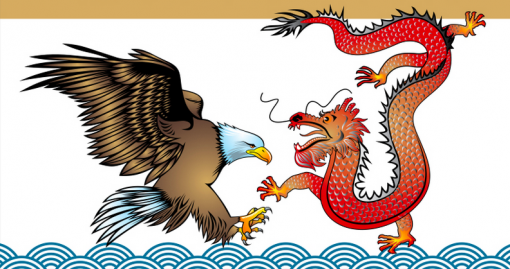The Eagle and the Dragon: Are we Destined for Conflict?
As Russia’s world power status is dying in the Dunbas “meatgrinder,” America’s greatest challenger in the world is now China. Since Chinese nationalists escaped the rise of Mao Zedong and his Chinese Communist Party by fleeing to the island of Formosa (Taiwan) in 1949, Communist China has long coveted the opportunity to reclaim that island. The United States has long promised security for Taiwan and assured them that we will not allow that island nation to fall. China is building its military and acting more aggressively in the South China Sea. The US has taken responsibility for containing China. Is containment necessary?
China in Context
China’s incredible economic growth in the last few decades has led many commentators to speculate that China might surpass the United States economically. This prospect loomed large over US thinkers and strategists for many years. China’s economic challenges have become more apparent in recent years and that has driven an awakening about the deep structural problems that face China. Truly insurmountable challenges await Chinese President Xi Jinping as he seeks to establish China as a world super-power.
China’s debt situation is perhaps the most pressing matter. China holds over three times its current GDP in debt, mostly at the local and provincial level. This debt is backed by real estate. The real estate in question constitutes mostly rental apartments that are vacant. So vacant, that China could house the population of France in its vacant apartments. Whole ghost towns exist with these empty apartment buildings in large blocks. These inarguably valueless structures cannot prop up the Chinese government forever. At some point, it is going to become clear that China’s local debts are backed by worthless real estate. The resulting crash could bring down the entire Chinese system.
Perhaps more troubling, China desperately needs its domestic population to consume goods and services. With ever decreasing working age individuals and the older generation hording money for retirement, it is unclear what could drive domestic consumption. Private debt is also a challenge in China, so consumers are much more likely to use any stimulus to remit debts or save for retirement then to increase consumption.
Must the United States Contain China?
The relationship between the United States and China today can be best described as weaponized interdependence. China depends upon the US for trade and upon the US maintained global economic system for food. The US has relied upon China for inexpensive manufacturing of everything from medicines to computer chips. The United States is increasingly seeking self-reliance, or rather non-reliance upon China in particular, for medicines and technological components.
China continues to strain against the US maintained global order. China seeks control of the South China Sea and has built artificial islands there in order to claim it. China continues to antagonize Taiwan and poses a serious threat to other US allies in Asia including South Korea and Japan. It is a truth, then, to say China is a serious threat to US interests. With Russia’s power waning due to their ill-advised invasion of Ukraine they have fallen into the role of junior partner in their friendship, but not quite alliance, with China. It is now safe to say China represents the greatest threat to the United States today. The US military and policymakers are slowly shifting US assets and strategic thinking in a way to counter Chinese aggression. Is this policy of containment truly necessary?
There is an argument out there that given China’s economic and demographic woes, the United States does not need to do anything to contain China but simply sit back and wait for the coming implosion. This policy of “strategic patience” suggests that like the Soviet Union, China will simply collapse in the future and the United States needs to do little to counter the threat. While generally sound, there are several problems with this line of thinking. The Soviet Union had weak and incompetent leadership at the time of its collapse in the form of Mikhail Gorbachev. Unwilling to act as a hard-nosed dictator like a Stalin or Mao, Gorbachev simply presided over the slow disintegration of the Soviet Union and took no serious action to try to preserve it.
The reforms Gorbachev enacted sought to convert the Soviet Union into a free market country more like the United States. Thus, the state that finally collapsed in 1990 was a Soviet Union on the path to becoming the opposite of what it had been built to be. It is safe to say the Soviet Union collapsed largely due to internal issues, although certain mounting external pressures aided in the process. It also collapsed from its leader’s lack of will power. China’s current leadership certainly seems to possess the will power to sustain their system.
President Xi is the closest thing China has had to Mao Zedong since Mao himself. The Covid lockdowns in China, the suppression of protests in Hong Kong, the way in which he drives policy with a single minded determination; Xi’s China is not going down without a fight. Even now, as China’s economy stands on the precipice, Xi has announced increased military spending. Chinese shipyards churn out warships with an incredible speed. Even though the capabilities of these warships versus their US Navy counterparts is questionable, eventually, China will have an overwhelming number of seagoing vessels. As Joseph Stalin once said: “quantity has a quality all its own.” A maxim he certainly proved correct in the Second World War.
Xi, it would seem, is very much unlike Gorbachev in that he does not seek western style reforms, he has not proven weak or incompetent, and he is building a military force with the clear objective of seizing land and sea territories near China. If one looks at the collapse of the Soviet Union as merely a reorganization of Russia as a nation, then it is Putin not Gorbachev who serves as the example of the leader of a waning power. An old bear, it seems, may be most dangerous when weak and dying. What of the Chinese dragon? If Xi’s attitudes and policies are any example, the dragon may very choose to strike while it still has teeth. China has about a decade left before its demographic situation reaches critical mass. That means the teeth may soon fall out; the clock is ticking for Xi. For this reason, too much strategic patience may prove to be negligent complacence instead.
The Eagle and the Dragon
China has about a decade left before demographic and economic forces crush its ability to make war and will remove it as a world power. In the meantime, if President Xi Jinping comes to the conclusion, at any time that his forces have an opportunity to seize Taiwan with what he will find to be acceptable losses on China’s side; he will certainly strike. China will only become more dangerous as they become more desperate. The US must contain China in the interests of peace and international order. To do this we must invest properly in the ability to make a war far more painful for China and less so for the United States. If China knows any attack on Taiwan will be a failure in any event, China will be less likely to strike. The time is now to reorient US forces and spending priorities away from past threats like Russia and Middle Eastern asymmetrical forces to counter China. Now is the time to take bold steps to prevent this war from ever becoming a reality.







